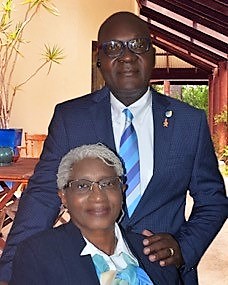Basic Education and Literacy - a District 7020 Perspective

Dr. Partick E. Adizua is District Governor of District 7020 this Rotary year.
Dr Patrick E. Adizua, medical doctor, graduated from “El Insituto Superior De Ciencias Medicas-Santiago De Cuba” in 1987 with honors and has a diploma in Spanish Language (with Distinction). He is a resident doctor in Ob-Gyn at the Mandeville regional hospital and has a general practice at Las Palmas medical complex. Most recently, he has added to his portfolio, Managing Director of Regies Fine Dining Restaurant.
District Governor 2018-2019, Patrick, is a member of the Rotary Club of Mandeville. His classification is “Medical” and he uses his vocation and passion for service to make a difference in his home country, Jamaica. He became a Rotarian in 1996, served as a director of his club in his first year of Membership and has not looked back since!
I was surfing the web for interesting articles on Basic Education and Literacy so that I could share with you, my few enthusiastic Rotarians and friends. I took a look at our neighboring District 7020, which encompasses the Northern Caribbean, as I frequently do, and read the District Governor's message for September. I share this message with you as it is focused on the theme for this month which is one of The Rotary Foundation's Six Areas of Focus: Basic Education and Literacy.
DG Patrick writes:
Dear fellow Rotarians,
Our beloved Rotary provides us with an array of resources that ensures that our service to humanity, not only makes a difference but inspires those that we serve. In September, Rotarians place emphasis on the importance and value of basic education, literacy and our young generation.
In the words of Nobel Prize Laureate Malala Yousafzai:
“One Child, one teacher, one pen and one book can change the world"
It is estimated that one billion people-one sixth of the world’s population – are unable to read. Illiteracy among adults and children is a global concern in both highly industrialized nations and developing countries. The tragedy of illiteracy is that those who cannot read are denied personal independence and they become victims of unscrupulous manipulation, poverty and the loss of human dignity. Illiteracy is demeaning, it is a major obstacle to achieving economic, political, social, and personal development and is a barrier to international understanding, cooperation and global peace.
Many Rotary clubs are thoughtfully surveying the needs of their community for literacy training. Some clubs provide basic books for reading instruction. Others establish and support reading and language clinics, provide volunteer tutorial assistance and purchase reading materials.
Rotarians can play a vitally important role in and around their communities and in developing countries, by promoting projects to facilitate opportunities that are derived with the ability to read. For example, Australian Rotarians developed the “Lighthouses for Literacy” projects in four schools in Thailand. This innovative teaching method proved so successful that the Thai government adopted it in all the nation’s schools. Other Rotary clubs have used this model to develop literacy projects in Bangladesh, South Africa, Brazil and other countries.
WHAT ARE THE ESTABLISHED FACTS?
- An additional 1.7 million teachers are needed worldwide to meet the goal of universal primary education.
- 57 million children worldwide, are not in school
- 781 million people over the age of 15 - 60 percent of them women - are illiterate
However, we have young and vibrant members of our Rotary family that are equipped with the tools to help us establish strategic and enriching projects across our communities.
Recently, I had the opportunity to visit transformative projects being carried out by Rotarians and Rotaractors in Grand Cayman, B.V.I and St Croix, where they are providing life-changing literacy experiences throughout their communities. This year more than ever before, our emphasis must be to empower our young generations, by fully embracing them in project concept, design and development for all our activities.
Past RI President Luis Vincente Giay at the 1996 Convention in Calgary, Alberta, Canada said:
“Our vision for the future, now more than ever, is the difference between success and failure.
The New Generations are our investment in the future.
Let us begin to build that future today”
Countless Rotaractors have undertaken innovative and creative literacy projects which we could easily tap into by partnering with them, to help us tackle these issues in our communities. Therefore, let us share our love for Rotary, by empowering our new generations, so that together we can inspire positive change globally.
“When love is infused into our actions, we do not stop to question the time or money we are sacrificing. We are inspired to do more, to give more. Love is the motivating force behind all of Rotary’s best work.”
-Carlo Ravizza 1999-2000
DG Patrick

